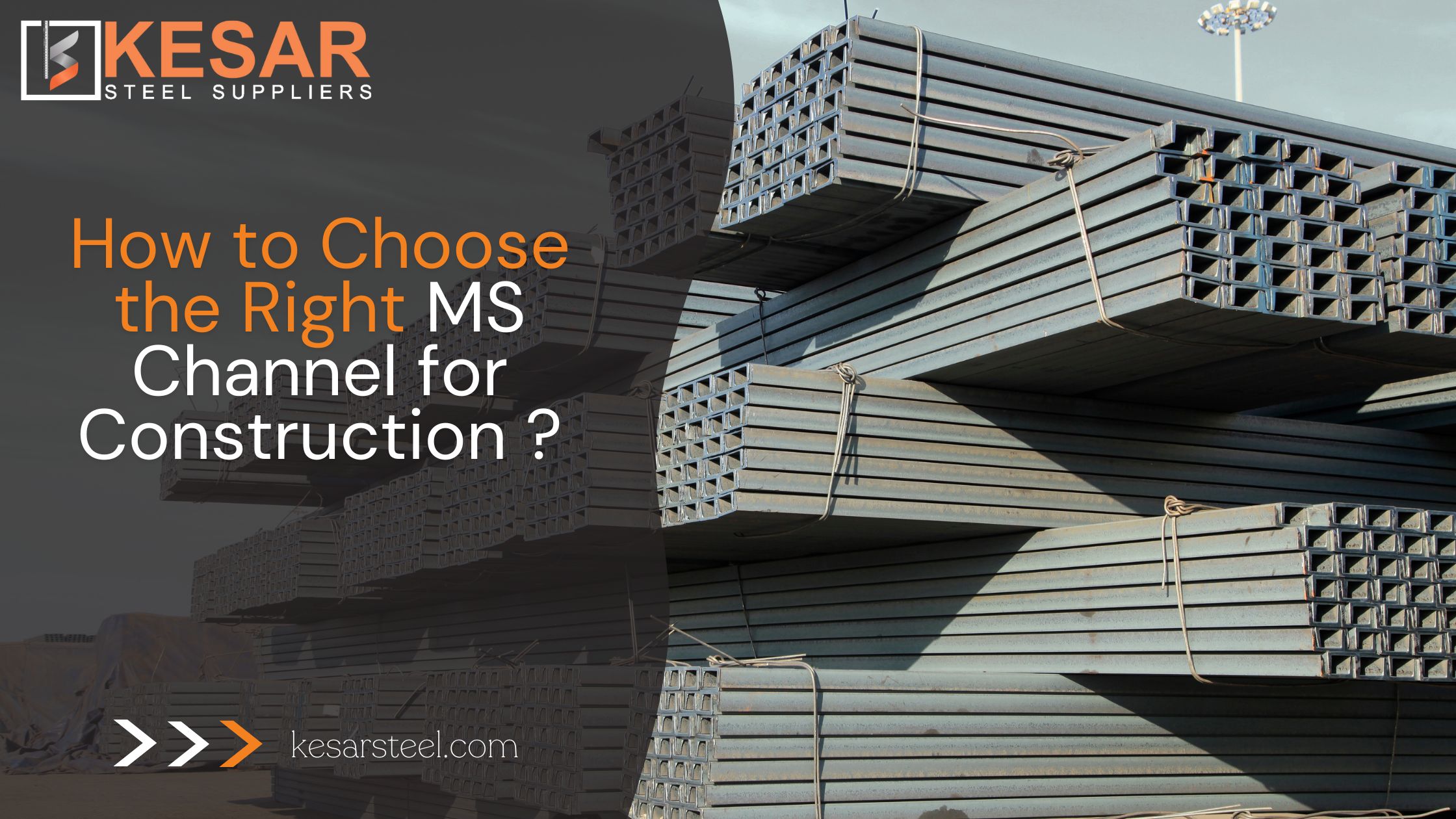How to Choose the Right MS Channel for Construction ?

19th Feb 2025
Mild Steel (MS) channels are the unsung heroes of construction. Strong, reliable, and cost-effective, they serve as the backbone of everything from industrial sheds to residential frames. If you're working on a construction or fabrication project and wondering what kind of steel support structure you should go for, MS channels are likely to be on the list. But how do you know which size, grade, or type is right for your needs?
We’ll help you break down what MS channels are, their key applications, and most importantly, how to choose the right one for your construction project.
What is an MS Channel?
An MS Channel, or Mild Steel Channel, is a C-shaped structural steel product used extensively in civil and industrial construction. It consists of two flanges connected by a central web, creating a cross-section that resembles the letter ‘C’.
These channels are manufactured as per IS (Indian Standard) specifications and are available in various standard sizes like ISMC 75, ISMC 100, ISMC 150, etc. The number typically denotes the depth of the channel in millimeters. Because of their shape, MS channels are known for their high load-bearing capacity with less material weight, which makes them a go-to material for strength without excess cost or bulk.
Why Are MS Channels Popular in Construction?
The popularity of mild steel channels in the construction world is no accident. These channels offer a great balance between strength, versatility, and affordability. Here’s why builders, engineers, and fabricators prefer MS channels:
- High Strength-to-Weight Ratio: MS channels can support heavy loads without being overly bulky.
- Easy to Fabricate: Mild steel is easy to cut, weld, and bend into required shapes.
- Corrosion Resistance (when coated): Galvanized or painted MS channels resist corrosion in outdoor applications.
- Budget-Friendly: Compared to other structural materials, MS channels are more affordable and widely available.
How to Choose the Right MS Channel for Construction
Now, the big question—how do you pick the right MS channel for your structure? Here are the main factors to consider:
1. Load-Bearing Requirements
Not all MS channels are created equal. The amount of weight a structure needs to support plays a key role in deciding the channel size and thickness. For instance, a residential framework won’t need the same load capacity as a bridge girder.
2. Size & Dimensions
Refer to the MS channel weight chart or MS channel size and weight guide to understand what suits your design. Sizes like ISMC 100 or ISMC 150 denote depth in mm, and different projects call for different specs.
3. Material Grade
Grades like IS 2062 E250 or E350 offer good tensile strength and durability. Choosing the right grade ensures structural reliability.
4. Environmental Conditions
If your project is located in a high-humidity or coastal area, corrosion resistance becomes critical. Galvanized MS channels or coated variants are recommended for such environments.
5. Project Compatibility
Ensure the MS channel fits into your architectural plan and does not create design conflicts. Check if your chosen supplier offers cutting or customization services to match specifications.
MS Channel Sizes and Grades: What to Know
There are multiple MS channel sizes available in the Indian market, with standard depths ranging from 75mm to 400mm. Each size comes with a unique weight per meter, which can be calculated using an MS channel weight formula.
Here’s where referencing a mild steel channel dimensions table becomes very helpful. Most manufacturers and MS channel dealers can also provide this data when you’re requesting quotes.
The most widely used steel grades are:
- IS 2062 E250 – General use
- IS 2062 E350 – Higher tensile strength for demanding structures
For precision in weight and design, always ask for a certified weight chart from your supplier.
Applications of MS Channels in Construction
MS channels are truly versatile and play a critical role in both structural and aesthetic parts of a building. Their most common applications include:
- Roof Trusses & Purlins: Providing support and structure to roofing systems.
- Bridges & Flyovers: Used in framework and guardrails.
- Building Frameworks: Support beams for walls, floors, and roofs.
- Fabrication Works: Frames for machinery, generators, and industrial setups.
- Highway Structures & Poles: MS channels also feature in signposts, barriers, and poles.
Builders often prefer MS channels for building construction because of their strength and ease of use, while fabricators value them for their shaping flexibility.
Why Builders Choose Kesar Steel for MS Channels
Kesar Steel has built a strong reputation as a reliable MS channel manufacturer and supplier in Gujarat. Here’s what makes us stand out:
- Wide range of mild steel channel sizes and grades in stock
- Competitive MS channel price per kg
- Products manufactured as per IS standards
- Trusted by leading contractors and engineers across India
- Strong logistics support for timely delivery
Looking for the best MS channel brand in Gujarat? We’ve got you covered.
Conclusion
Choosing the right MS channel can make or break your project. From understanding your load-bearing needs to selecting the right size, grade, and coating, every step matters. When selected carefully, MS channels for structural support offer both performance and peace of mind.
So, whether you’re constructing a commercial building or working on industrial fabrication, go with a trusted name. At Kesar Steel, we’re committed to delivering quality products that meet your exact requirements.
Need help choosing the right MS channel for your project? Contact us for expert support and a custom quote today.






